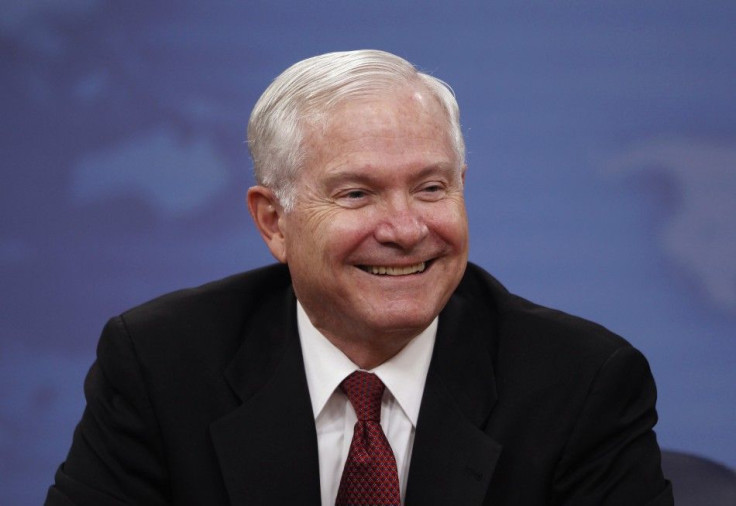Former Defense Chief Gates Says President Obama Can Kill Americans Overseas, But Backs Some Oversight

The burning question of presidential power to assassinate U.S. citizens abroad suspected of terrorist activity got an answer from former Defense Secretary Robert Gates on Sunday.
Gates said on CNN's “State of the Union” that while he supports this type of extrajudicial assassination he also would endorse “some check” on the president’s authority to approve such actions.
Gates, who was named by President George W. Bush to replace Donald Rumsfeld in December 2006 and was kept on by Barack Obama until July 2011, was asked by host Candy Crowley about the September 2011 drone strike in Yemen that killed U.S. citizens and militant Islamists Anwar al-Awlaki and Samir Khan. Here’s the full exchange:
CROWLEY: [Al-Awlaki] was nonetheless an American citizen, and as we are led to believe how this works, it's the president who okays a kill list and that would include American citizens. Should that be sort of a broader authority?
GATES: I think that the idea, you know, we have this Foreign Intelligence Surveillance court that approves the use of electronic surveillance on American citizens. So you have an independent person, a federal judge, outside of the executive branch…
CROWLEY: This is for surveillance.
GATE: Yes, this is for electronic surveillance. Something similar, whether it's a panel of three judges or one judge or something that would give the American people confidence that, that there was, in fact, a compelling case to be, to launch an attack against an American citizen. I think just as an independent confirmation, or affirmation if you will, is something worth giving serious consideration to.
I think that the rules and practices that the Obama administration has followed are, are quite stringent, and are not being abused. But who is to say about a future president? And so I think, I think this idea of being able to execute in effect an American citizen, no matter how awful, having some third party being, having a say in it or perhaps some informing the Congress or the intelligence committees or something like that, I just, I think some check on the ability of a president to do this has merit as we look to the longer-term future.
Gates was also asked why there was immediate outrage over America’s use of torture techniques under the Bush administration and yet the American people seem largely OK with killing these same type of suspects.
Gates replied: “By a certain point, virtually nothing President Bush did was going to win approval by anybody. And anything he did was condemned, from the surge [the 2007 buildup of forces in Iraq] to various other things, and I just think that [politics] certainly plays a part in it. And particularly a lot of our political leaders have no problem talking out of both sides of their mouth when it comes to issues like these.”
Conservatives have used this issue to slam liberals for a double standard that gives Obama a pass on pre-emotive strikes. The Bush administration was criticized heavily for similar policies perceived to violate civil or human rights, including the use of torture on terror suspects and warrantless wiretapping, including of Americans.
“There hasn't been a huge outcry from those on the left who attacked President Bush for his doctrine of pre-emptive strikes against terrorists,” said conservative columnist Cal Thomas in a syndicated opinion piece last week. “Recall, too, the vitriol directed at Vice President Cheney for defending 'enhanced interrogation' techniques on suspected terrorists in order to obtain information that might prevent new attacks against Americans."
Sen. Rand Paul, R-Ky., took the criticism a step further, expressing sympathy to Al-Awlaki’s 16-year-old son Abdulrahman, who was killed in a separate drone strike two weeks after his father.
“It’s very unseemly that a politician gets to decide the death of an American citizen," Paul said Sunday on CNN's "State of the Union." "They should answer about this 16-year-old boy, al-Awlaki’s son, that was killed, not in collateral damage but in a separate strike. They never answered that. I think you should be tried for treason if you’re an American citizen, you go overseas and you take up arms. I’m probably for executing you, but I want to hear the evidence.”
The controversy over this policy comes after a 2012 Justice Department 16-page white paper was leaked to NBC News outlining the justifications. It says the president can authorized the targeted killing of people deemed to be high-ranking members of Al Qaeda or “an associated force,” if they are posing an “imminent” threat of attacking the U.S. and if their capture is not feasible.
John Brennan, who was picked by Obama to take over the Central Intelligence Agency after Gen. David Petraeus resigned from the job in November over an extramarital affair, is said to be behind the increased use of unmanned aircraft piloted remotely from secret locations under the Obama administration.
According to the New America Foundation, since 2004 as many as 3,284 people were killed by 350 U.S. drone strikes in Pakistan alone. Out of this tally, 18 to 23 percent of these casualities were said to be civilian non-combatants.
During his Senate confirmation hearing last week, Brennan, who served as deputy executive director of the CIA during the Bush administration, also admitted he was aware that intelligence officers were engaged in “enhanced interrogation” techniques and did not try to stop them.
© Copyright IBTimes 2024. All rights reserved.





















